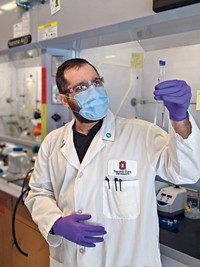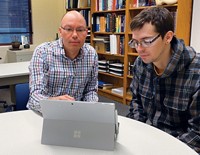Advertisement
Grab your lab coat. Let's get started
Welcome!
Welcome!
Create an account below to get 6 C&EN articles per month, receive newsletters and more - all free.
It seems this is your first time logging in online. Please enter the following information to continue.
As an ACS member you automatically get access to this site. All we need is few more details to create your reading experience.
Not you? Sign in with a different account.
Not you? Sign in with a different account.
ERROR 1
ERROR 1
ERROR 2
ERROR 2
ERROR 2
ERROR 2
ERROR 2
Password and Confirm password must match.
If you have an ACS member number, please enter it here so we can link this account to your membership. (optional)
ERROR 2
ACS values your privacy. By submitting your information, you are gaining access to C&EN and subscribing to our weekly newsletter. We use the information you provide to make your reading experience better, and we will never sell your data to third party members.
Careers
Joy of Discovery Buoys ACS Scholar Harry Bermudez
University of Massachusetts, Amherst, polymer science professor now mentors others in chemistry-focused program aimed at underrepresented minority students
by Bethany Halford
March 30, 2015
| A version of this story appeared in
Volume 93, Issue 13

Before Harry Bermudez was even born, his parents decided to pack up and leave their home, family, and friends in Colombia to make a new life in New York City. It wasn’t an easy move, Bermudez says. They had a three-year-old child, Bermudez’s older brother, and they had to leave behind the life they had known. But economic and political factors drove them to the U.S., which Bermudez says was like a beacon of hope for them.
The family settled in Queens. Bermudez’s mother, who is now retired, worked in home health care, and his father found work as a facilities manager. He’s still working, in fact, at an age when most of his contemporaries have happily retired. “He’s a workaholic,” Bermudez says. “I get that from him.”
Bermudez’s parents encouraged him to do well in school. “For their children to get an education and a college degree was important,” he says. An aptitude for science drew Bermudez to Brooklyn Technical High School, and it was there he developed a true interest in science and technology. “I had some great teachers who challenged us as students to not just memorize material for exams but to try to develop a curiosity about the world around us,” he recalls. “If you think about chemistry being the central science, that’s easy to do.”
He studied chemical engineering at the University of Massachusetts, Amherst, earning a B.S. in 1998, and went on to get a Ph.D. in chemical engineering in 2003 at the University of Pennsylvania, where he participated in a joint project with professors Daniel A. Hammer and Dennis E. Discher. For his postdoctoral studies, Bermudez decided to go abroad, working in Jeffrey A. Hubbell’s lab at the Swiss Federal Institute of Technology (ETH), Lausanne.
Now Bermudez runs his own research group as a professor in the department of polymer science and engineering at his alma mater, UMass Amherst. He earned tenure there earlier this year. He and his group use block copolymer films to study how cells interact with materials. They also investigate DNA as a material for gene and drug delivery.
Bermudez has a two-word philosophy for tackling scientific problems: “Work hard,” he tells C&EN. “We put in a lot of thought before we do an experiment to try to anticipate what might happen,” he elaborates. “But at the end of the day, research is really discovery driven. We get in there. We do experiments. We deliberately put ourselves in an uncomfortable situation where we don’t know everything that’s going to happen.” After all, “if we knew what was going to happen, it would be boring.”
People often struggle on the path Bermudez has taken, but he says that wasn’t really the case for him. “I was having so much fun doing scientific research and learning and discovering things. There is always the drudgery of any job. But the joy of discovery is the most important part of being in a research-related career.”
As a student, Bermudez was also encouraged through receiving the ACS Scholar award. He applied for the award during his junior year of college. “As an undergrad I was fortunate enough to have a couple of internships that provided me with some pocket money, but the financial aid package wasn’t covering everything,” he remembers. “When I heard about the ACS scholarship, I thought that it was a great way to reduce my debt burden—to not have that hanging over my head. I applied on a whim. I was really pleasantly surprised when I found out that I got it.
“The flexibility of the award allows you to address your own personal needs, whether that’s buying books or helping to pay for tuition,” Bermudez adds. Also, he says, “I really felt connected to a larger community as an ACS Scholar. I think that’s important for the scholars as they move through their career trajectory.”
Now Bermudez helps review applications to the ACS Scholars Program and mentors scholars at UMass Amherst. In fact, pairing students with a mentor—a faculty member who is a resource, someone to talk to and help the scholar get through any difficulties they might encounter—is a valuable aspect of the program, he says. “I really feel a responsibility to help the next generation of students. Some of these kids have overcome huge obstacles to get where they are. Being able to help them in some small way is a great feeling.”
The ACS Scholars Program awards renewable scholarships of up to $5,000 each per academic year to underrepresented minority students who want to enter chemistry or chemistry-related fields. For more information, go to
http://www.acs.org/success.






Join the conversation
Contact the reporter
Submit a Letter to the Editor for publication
Engage with us on Twitter